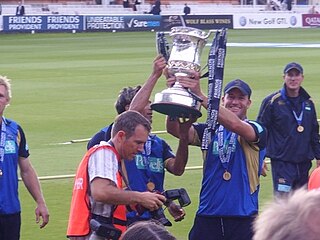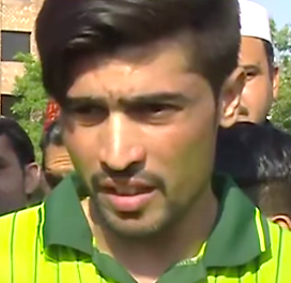Related Research Articles
Limited overs cricket, also known as white ball cricket, is a version of the sport of cricket in which a match is generally completed in one day. There are a number of formats, including List A cricket, Twenty20 cricket, and 100-ball cricket. The name reflects the rule that in the match each team bowls a set maximum number of overs, usually between 20 and 50, although shorter and longer forms of limited overs cricket have been played.
In cricket, an umpire is a person who has the authority to make decisions about events on the cricket field according to the Laws of Cricket. Besides making decisions about legality of delivery, appeals for wickets and general conduct of the Game in a legal manner, the umpire also keeps a record of the deliveries and announces the completion of an over.

Twenty20 is a shortened format of cricket. At the professional level, it was introduced by the England and Wales Cricket Board (ECB) in 2003 for the inter-county competition. In a Twenty20 game, the two teams have a single innings each, which is restricted to a maximum of twenty overs. Together with first-class and List A cricket, Twenty20 is one of the three forms of cricket recognised by the International Cricket Council (ICC) as being played at the highest level, both internationally and domestically.

Abdul Razzaq is a Pakistani cricket coach and former cricketer, who played all formats of the game. Known as a gifted all-rounder, he was a right-arm fast-medium bowler and a right-handed batsman. He emerged in international cricket in 1996 with his One Day International debut against Zimbabwe at his home ground in Gaddafi Stadium, Lahore; just one month before his seventeenth birthday. He was part of the Pakistan Cricket squad that won the ICC World Twenty20 2009. He was a part of the Pakistan squad which finished as runners-up at the 1999 Cricket World Cup. He played 265 ODIs and 46 Tests.

Kevin Peter Pietersen is a former England international cricketer. He is regarded as one of the greatest England batsmen to have played the game. He is a right-handed batsman and occasional off spin bowler who played in all three formats for England between 2004 and 2014, which included a brief tenure as captain. He won the Player of the Series award for his performances in 2010 ICC World Twenty20 which helped England to win their maiden ICC trophy.
Yorkshire County Cricket Club in 2005 were in the second division of both the County Championship and the totesport League. At 6–1 odds to win the Second Division of the County Championship, they were likely to struggle again – as they had done since they won the First Division championship in 2001.
Derbyshire County Cricket Club in 2005 was the cricket season when the English club Derbyshire had been playing for one hundred and thirty-five years. They reached the semi-final in the Cheltenham and Gloucester Trophy. In the County Championship, they finished ninth in the second division and in the National League, they finished sixth in the second division. They were eliminated at group level in the North section of the Twenty20 Cup.
Surrey County Cricket Club, in 2005, played their cricket in the First Division of the County Championship and the Second Division of the totesport League. The 2004 season was a disappointment for Surrey under the captaincy of Jonathan Batty, who was replaced by Mark Butcher in 2005. However, Butcher was out for most of the season due to an injury to his left wrist, leaving Mark Ramprakash as interim captain – one of the few, maybe the only, man to captain both Surrey and their arch-rivals Middlesex.
The Scottish Saltires in 2005 are playing in the Second Division of the totesport League, in what will be their last season in the English one-day league. They will also compete for a World Cup place in the ICC Trophy and in the first-class ICC Intercontinental Cup.

The Scotland national men's cricket team represents the country of Scotland. They play most of their home matches at The Grange, Edinburgh, as well as at other venues around Scotland.

The Friends Provident Trophy was a one-day cricket competition in the United Kingdom.

Ian Joseph Harvey is a former Australian cricketer. He was an all-rounder who played 73 One Day Internationals for Australia and was named as one of the five Wisden Cricketers of the Year for 2004 for his performances in county cricket. He was a part of the Australian squad which won the 2003 Cricket World Cup.
Twenty20 cricket is played over 20 overs according to normal limited-over rules, the one exception being the rule for "timed out", where the time by which an incoming batsman must be at the crease ready to receive his first ball is reduced to 90 seconds after the outgoing batsman has been dismissed. This amendment to the rules helps speed up the game. Additionally, boundary ropes tend to be shorter in Twenty20 cricket than for normal limited over games.

Luke James Wright is an English former cricketer. He was a right-handed batsman and a right-arm medium bowler. Wright joined Sussex in 2004, having started his career at Leicestershire. He was named in England's squad for the Under-19 World Cup in 2004, and joined the International Twenty20 squad for the 2007 Twenty20 World Championship in September 2007. He made his One Day International debut on 5 September 2007 against India. In November 2022, he became a selector for the England men's team, announcing his retirement from playing at the same time. Wright was a member of the England team that won the 2010 ICC World Twenty20.
The 2006 English cricket season was the 107th in which the County Championship had been an official competition. It included home international series for England against Sri Lanka and Pakistan. England came off a winter with more Test losses than wins, for the first time since 2002-03, but still attained their best series result in India since 1985. The One Day International series against Pakistan and India both ended in losses.

Graham Richard Napier is an English former cricketer. He was a right-handed batsman and a right-arm medium pace bowler. Napier played first-class cricket for his home county of Essex since the outset of his senior career in 1997. Between 1997 and 1999 Napier played in four Youth Test matches in England against Zimbabwe, South Africa (twice) and Australia's respective under-19 teams. He was also a member of the 1998 Under-19 Cricket World Cup winning squad. Napier was on the books of Ipswich Town as a goalkeeper and played for a season on loan at Felixstowe Town. He retired at the end of the 2016 season.

The 2007 ICC World Twenty20 was the inaugural edition of the ICC Men's T20 World Cup, formerly known as the ICC World Twenty20 that was contested in South Africa from 11 to 24 September 2007. Twelve teams took part in the thirteen-day tournament—the ten Test-playing nations and the finalists of the 2007 WCL Division One tournament: Kenya and Scotland. India won the tournament, beating Pakistan in the final.
A Super Over, also known as a one-over eliminator or a one over per side eliminator, is a tie-breaking method used in limited-overs cricket matches. If a match ends in a "tie", it proceeds to a Super Over, in which each team plays a single additional over of six balls to determine the match winner. The team scoring the most runs in that over is declared the winner. Following a rule change in October 2019 for knockout and bilateral series matches, if the first Super Over also ends in a tie, another Super Over is played.

Mohammad Amir is a Pakistani former cricketer who played for the Pakistan national cricket team. He is a left-arm fast bowler and a left-handed batsman. He retired from international cricket in 2020. Later on 24 March 2024, he took his retirement back and made himself available for the Pakistan cricket team. After playing in the T20 World Cup in June 2024, he announced retirement again in December 2024. He was a member of the Pakistan team that won the 2009 ICC World Twenty20 and 2017 ICC Champions Trophy.

Cricket is a bat-and-ball game played between two teams of eleven players on a field, at the centre of which is a 22-yard pitch with a wicket at each end, each comprising two bails balanced on three stumps. Two players from the batting team, the striker and nonstriker, stand in front of either wicket holding bats, while one player from the fielding team, the bowler, bowls the ball toward the striker's wicket from the opposite end of the pitch. The striker's goal is to hit the bowled ball with the bat and then switch places with the nonstriker, with the batting team scoring one run for each of these exchanges. Runs are also scored when the ball reaches the boundary of the field or when the ball is bowled illegally.
References
- ↑ Mott, Oliver CCT20 Rules 2009 Archived 2011-09-28 at the Wayback Machine , 7 May 2009, ECB. Retrieved on 31 July 2009.
- ↑ "Bowl Out I Bowl Out In Cricket I What is a bowl out?". Cricketfile. 22 February 2021. Archived from the original on 2022-06-26. Retrieved 2022-12-17.
- 1 2 Streeton, Richard (28 June 1991). "Bowl-out leads to minor upset" . The Times. Retrieved 1 November 2024– via The Times Digital Archive.
- ↑ "Surrey v Oxfordshire, The Foster's Oval, Kennington on 27th June 1991". CricketArchive. Retrieved 1 November 2024.
- ↑ Kiwis defeat Windies in bowl out Archived 2007-03-09 at the Wayback Machine (BBC News, 16 February 2005)
- ↑ Black Caps win first-ever bowl-off (Independent Online, 16 February 2005)
- ↑ India defeat Pakistan in bowl-out Archived 2017-12-12 at the Wayback Machine (BBC News, 14 September 2007)
- ↑ Surrey beat Bears after bowl-out Archived 2007-03-11 at the Wayback Machine (BBC News, 18 July 2005)
- ↑ Somerset beat Lancs in bowl-out, 30 July 2009, BBC Sport. Retrieved on 31 July 2009.
- ↑ Holders feel blue after bowl-out ( The Telegraph , 9 July 2004)